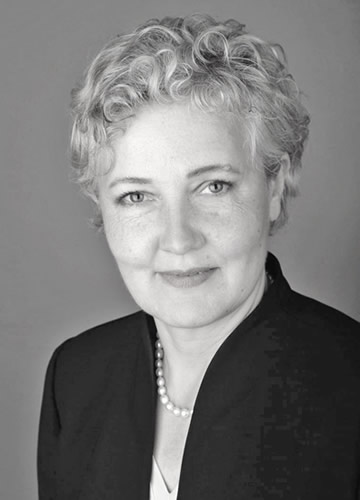编者按:Loidl-Reisch教授是柏林工业大学规划建造环境学院,风景园林和环境规划系,风景园林建造专业的主任。在今年7月1日,她接受了风景园林新青年的采访。在采访中,Loidl-Reisch教授介绍了她的特色教学理念并与我们分享了她的最新研究成果。在此,我们向大家介绍她对风景园林建造的深刻见解,希望为年轻的风景园林师提供多样化的视角来理解风景园林。

Loidl-Reisch教授
风景园林新青年:这个系的教学特点是什么?
Loidl-Reisch教授:让这里的教学与其他部门不同的地方在于我们教授风景园林建造的细节。这些细节是以可持续性为标准的。
我个人尤其关注设计的可利用程度以及它们在日常生活中的品质。这就是说在一个相当长的时间尺度下,在人们每日的生活中,它们能做到多好。
另外,园林史对我们也非常重要。了解历史是为了未来的需要。因此我们需要深入了解技术在历史园林中是如何应用的。
就在现在,我们就有一位教授在奥地利南部对一个历史园林进行考古发掘,她在约一米深的土层下发掘出一段用于营造水景的水管。它也是联系德国和奥地利的宏观人工输水系统的一部分。通过这段水管我们可以推测17世纪园林的水景技术。
针对学生的教学主要有三种形式:教学课程、辅导讨论和设计项目。其中设计项目是最为重要的。学生们进行的设计项目一般是实验性和理论性的项目。例如,我们的一个学生作业就是要求设计一个6×6×0.45的场地,场地的设计要兼顾材料的特性、地形、空间的塑造和对气候环境的适应。学生通过这样的设计可以认识和体验到不同材料的特点,练习对场地进行处理的手法。
我们的学生有时也有机会在校园里进行亲自动手操作的建造实习。像修整校园里的小花园这样的工程。但是这样的实习组织比较复杂,需要考虑学生的时间,并提供建材、机械等。所以一般每年也就只有一次。
风景园林新青年:教学与职业实践之间的关系是怎样的?
Loidl-Reisch教授:在教学中我们会时常邀请从业设计师参加讨论交流的环节。也会邀请经验丰富的设计师给学生开设讲座传授设计实践中的工程经验。另外,与我们保持长期联系的从业设计师中有的是DIN制订委员会的委员。与他们的交流会间接的造成行业标准制订与教学成果之间的互相反馈。
学生在学习和完成设计项目的过程中需要了解并遵守行业中的规范和标准。通过学校图书馆的数据库,我们的学生可以很方便地查找到所需要的规范和标准。德国的行业规范和标准体系非常详细,内容很多,覆盖了工程的各个领域,从工程做法的技术术语到各种材料的规格和指标以及工程的造价预算等方方面面。通过在线数据库,学生们可以在保证不用作商业用途的前提下免费获得这些内容。
从业设计师需要熟悉行业相关的法律法规和规范标准。对法规的掌握是从业设计师与在读学生之间的重要区别。通过在学习过程中对规范标准的应用,可以帮助学生逐渐掌握成为合格设计师所需要的知识。
风景园林新青年:您最近的研究方向是什么?
Loidl-Reisch教授:我们目前最新的研究成果是可持续性户外建造的导则体系《可持续建筑导则──户外设施》。在建造项目中,一旦工程建成就很难改变对环境的影响或自身的可持续性。相对工程项目的建造过程,工程项目在概念和方案阶段的决策对项目最终的可持续性更为重要。我们研究的评价体系就是为了帮助设计师和甲方在决策过程中更有效地对设计方案进行评估,最终通过正确的决策提升工程项目的可持续性。
这个体系包括27个大类逾135项具体指标,考虑了材料、种植、建造过程等多种因素,以及对土壤等客观环境要素的影响。
目前这项研究的成果已经被联邦政府采用,作为德国风景园林建造项目必须参考的指标体系。
The interview with Prof. Cordula Loidl-Reisch
Prof. Loidl-Reisch is Head of the Chair of Landscape Construction in the Department of Landscape Architecture and Environment Planning, School of Planning Building Environment, Technical University of Berlin. On this July 1st, she accepted the interview of Youth Landscape Architecture. In the interview, Prof. Loidl-Reisch introduced the characteristic educating concepts of her department and shared her latest research achievement concerning sustainable construction with us. Hereby, we present her profound opinions on teaching and researching of landscape architectural construction, in the hope that a variety of viewpoints on landscape architecture could be introduced to the young generation of Chinese landscape architects.
YouthLA: What is the character of the teaching in this department?
Prof. Loidl-Reisch: What makes this department different is that we have to teach detailing landscape with the criteria of sustainability.
What I am concerning is on usability and the quality of design in daily life; on how good a design could be in everyday life over a long time.
On the other hand, garden history is also very important to us. To know the history is for the future. We have to understand the implementation of the traditional technology by studying the historic garden.
Right now, one of the professors from our department is working in southern Austria on archaeological investigation. She found a piece of water pipe on the site of a 17th-century garden about one meter underneath the surface. It turned out not only to be part of the waterscape of a garden but also a part of artificial water transport system connecting Austria and Germany. By digging the pipe we can reveal the technology of the waterscape in 17 century.
As to the students’ study, there are 3 contents: teaching courses, seminars and projects. Among them, the projects are the most important. The projects that students involved are generally experimental and theoretical. For example, one of the projects assigned to the students is a design for a site with the size of 6m*6m*0.45m. The students were asked to implement variety of materials to get experience of how to shape surfaces and how to project against weather.
Sometimes, our students have chances to work in practical projects on the campus, for example, the projects like garden maintenance. But it is complicated to organize such practice, because we have to concern about students’ time and try to arrange the supply of materials and machines. So, the frequency of such practice is about once a year.
YouthLA: What’s the relationship between the teaching and professional practice?
Prof. Loidl-Reisch: In the teaching process, we usually invite practitioners to join us in the seminar. We also invite experienced landscape architects to give teaching lessons about project experience. In addition, the landscape architects who are in very closed contact with us are members of the DIN committee. The communication with them is an indirectly exchange of teaching outcomes and updated information of professional criteria and regulations.
Students have to study and follow the professional criteria and regulations during projects and studies. With the database of the university library, our students can find the published regulation and criteria very conveniently. The system of German professional regulations and criteria is very sophisticated. There are very detailed and specific contents covering every aspects of the field, from the standard terminology to the standards of the variety of the materials as well as the price and budget of projects. By using online database, the students are allowed to acquire all these contents for free with non-commercial preconditions.
Practitioners have to be familiar with the legal system, the standards and criteria in the field. It is the obvious differences between students and practitioners that the understanding and familiarities of the legal system. It would be very helpful for the students to get legal knowledge and get ready in the professional field to implement the professional criteria and regulations in study.
YouthLA: What is your latest researching direction?
Prof. Loidl-Reisch: Our latest research outcome is the guideline of landscape architectural sustainability “Leidfaden Nachhaltiges Bauen – Außenanlagen”. In construction projects, when the construction is completed, it would be very difficult to resist the environmental impacts or to improve the character of suitability. Thus, compared with the process of constructions, the decisions made in the process of conceptual design and solution exploring are much more significant for the final character of sustainability of the project. Our research intended to help the clients and landscape architects to evaluate the sustainability of the proposals efficiently and make right decisions to improve it.
The system contains 27 types and more than 135 indicators, concerning the variety of items of materials, planting and constructing and the impacts to environmental elements, for instance, the influence to the soil.
Now, the outcomes of this research have been accepted by the federal government and been published on line as the obligated references of outdoor construction projects in Germany.
